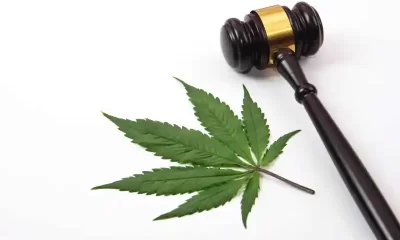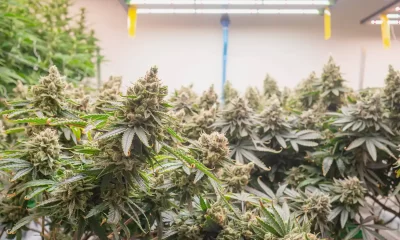Business
New Washington Regulations Require Cannabis Pesticide Testing

In April 2022, new Washington State Liquor and Cannabis Board (LCB) cannabis pesticide testing final rules took effect. Under the rules, cannabis flower and intermediate products must undergo contaminant testing. The rationale for the is consumer safety – which seems like a legitimate concern given that recreational use cannabis producers were previously not required to test for pesticides at all. Indeed, one cannabis testing laboratory released a white paper earlier this year claiming that cannabis pesticide contamination is a serious issue in Washington, especially for concentrates that, when tested on an “off the shelf” basis in 2018, had pesticide failure rate as high as 40%.
While the LCB’s goals may be sincere, they will have some pretty significant effects on the industry. In this post, we outline what we think are the two biggest ones:
- Cannabis pesticide testing is now required for cannabis flower and all intermediate cannabis products that are used in the creation of end products like cannabis extract and concentrates; and
- Lots, batches, and (“theoretically” according to the LCB) harvests that fail pesticide sample testing may no longer be remediated and those that fail must be destroyed.
Strangely, while it appears that the new regulations allow for producers and processors to pay for retesting of failed samples, our understanding from the LCB is that licensees can only retest failed sample tests for Pyrethrins (a naturally occurring pesticide found in over 2,000 registered pesticide products). Licensees will have to destroy crops from all other failed sample tests without any opportunity for retesting or remediation. This is a pretty extreme rule that is likely to have massive consequences for the industry.
Additionally, the LCB has not issued guidance on the implication that a failed lot or batch would be considered to have on the harvest it came from, though it did say that theoretically failed sample tests could result in an entire harvest needing to be destroyed, depending on the test results. Neither was the LCB forthcoming in how it planned to enforce the pesticide testing requirements.
In the absence of regulatory guidance, market participants are bound to change their practices and contracts to make sure they are not the ones left without a chair when the music stops. It is hard to imagine these new rules not resulting in downstream testing compliance requirements by retailers to processors and producers. Processors in particular, says the white paper cited above “who extract cannabis oil from plant material hold the greatest risk.” Because producers alone have direct control over pesticide use and avoidance procedures pre-harvest, the burden of compliance will likely be shifted to them.
The only way for retailers and processors to ensure they are not the party left holding the (tainted) bag is to contractually require producers to prove post-harvest cannabis pesticide testing compliance before accepting delivery of product. Retailers and processors will also require producers to indemnify them, even if the producers certify that they have complaint products. There may also be implications for testing labs as well, though if they are smart, they will provide only very limited recourse for inaccurate cannabis pesticide testing. In order to ensure acceptance by processors and retailers, producers will need to determine a cost efficient and reliable system of pre and post-harvest pesticide testing. All of this is likely to have significant contractual, economic, and regulatory consequences for the entire marketplace.
Adding to what is likely to be an uncertain and potentially costly implementation period are serious infrastructure concerns with respect to producers and processors being able to access adequate cannabis pesticide testing from certified labs within the state. The white paper cited above states that “only five out of the eleven Washington state certified laboratories have the technological capability, and WSLCB authorization, for cannabis pesticide testing.” The pesticide action level rule lists 59 pesticide compounds and their acceptable thresholds, but few labs in the state have the technology or accreditation to test for all 59. The LCB did comment on the infrastructure issue and is hopeful that problem will be short term.
All market participants are likely to be impacted to some degree by these new rules and the LCB’s currently unknown enforcement policies. Making matters worse, the ability, or lack thereof, to access reliable and efficient cannabis pesticide testingfacilities raises significant compliance and enforcement issues for producers, processors, and retailers.
We will be monitoring cannabis pesticide testing developments on this issue and intend to follow this post with proposed best practices for compliance and enforcement with these new regulations.
Business
New Mexico cannabis operator fined, loses license for alleged BioTrack fraud

New Mexico regulators fined a cannabis operator nearly $300,000 and revoked its license after the company allegedly created fake reports in the state’s traceability software.
The New Mexico Cannabis Control Division (CCD) accused marijuana manufacturer and retailer Golden Roots of 11 violations, according to Albuquerque Business First.
Golden Roots operates the The Cannabis Revolution Dispensary.
The majority of the violations are related to the Albuquerque company’s improper use of BioTrack, which has been New Mexico’s track-and-trace vendor since 2015.
The CCD alleges Golden Roots reported marijuana production only two months after it had received its vertically integrated license, according to Albuquerque Business First.
Because cannabis takes longer than two months to be cultivated, the CCD was suspicious of the report.
After inspecting the company’s premises, the CCD alleged Golden Roots reported cultivation, transportation and sales in BioTrack but wasn’t able to provide officers who inspected the site evidence that the operator was cultivating cannabis.
In April, the CCD revoked Golden Roots’ license and issued a $10,000 fine, according to the news outlet.
The company requested a hearing, which the regulator scheduled for Sept. 1.
At the hearing, the CCD testified that the company’s dried-cannabis weights in BioTrack were suspicious because they didn’t seem to accurately reflect how much weight marijuana loses as it dries.
Company employees also poorly accounted for why they were making adjustments in the system of up to 24 pounds of cannabis, making comments such as “bad” or “mistake” in the software, Albuquerque Business First reported.
Golden Roots was fined $298,972.05 – the amount regulators allege the company made selling products that weren’t properly accounted for in BioTrack.
The CCD has been cracking down on cannabis operators accused of selling products procured from out-of-state or not grown legally:
- Regulators alleged in August that Albuquerque dispensary Sawmill Sweet Leaf sold out-of-state products and didn’t have a license for extraction.
- Paradise Exotics Distro lost its license in July after regulators alleged the company sold products made in California.
Golden Roots was the first alleged rulebreaker in New Mexico to be asked to pay a large fine.
Source: https://mjbizdaily.com/new-mexico-cannabis-operator-fined-loses-license-for-alleged-biotrack-fraud/
Business
Marijuana companies suing US attorney general in federal prohibition challenge

Four marijuana companies, including a multistate operator, have filed a lawsuit against U.S. Attorney General Merrick Garland in which they allege the federal MJ prohibition under the Controlled Substances Act is no longer constitutional.
According to the complaint, filed Thursday in U.S. District Court in Massachusetts, retailer Canna Provisions, Treevit delivery service CEO Gyasi Sellers, cultivator Wiseacre Farm and MSO Verano Holdings Corp. are all harmed by “the federal government’s unconstitutional ban on cultivating, manufacturing, distributing, or possessing intrastate marijuana.”
Verano is headquartered in Chicago but has operations in Massachusetts; the other three operators are based in Massachusetts.
The lawsuit seeks a ruling that the “Controlled Substances Act is unconstitutional as applied to the intrastate cultivation, manufacture, possession, and distribution of marijuana pursuant to state law.”
The companies want the case to go before the U.S. Supreme Court.
They hired prominent law firm Boies Schiller Flexner to represent them.
The New York-based firm’s principal is David Boies, whose former clients include Microsoft, former presidential candidate Al Gore and Elizabeth Holmes’ disgraced startup Theranos.
Similar challenges to the federal Controlled Substances Act (CSA) have failed.
One such challenge led to a landmark Supreme Court decision in 2005.
In Gonzalez vs. Raich, the highest court in the United States ruled in a 6-3 decision that the commerce clause of the U.S. Constitution gave Congress the power to outlaw marijuana federally, even though state laws allow the cultivation and sale of cannabis.
In the 18 years since that ruling, 23 states and the District of Columbia have legalized adult-use marijuana and the federal government has allowed a multibillion-dollar cannabis industry to thrive.
Since both Congress and the U.S. Department of Justice, currently headed by Garland, have declined to intervene in state-licensed marijuana markets, the key facts that led to the Supreme Court’s 2005 ruling “no longer apply,” Boies said in a statement Thursday.
“The Supreme Court has since made clear that the federal government lacks the authority to regulate purely intrastate commerce,” Boies said.
“Moreover, the facts on which those precedents are based are no longer true.”
Verano President Darren Weiss said in a statement the company is “prepared to bring this case all the way to the Supreme Court in order to align federal law with how Congress has acted for years.”
While the Biden administration’s push to reschedule marijuana would help solve marijuana operators’ federal tax woes, neither rescheduling nor modest Congressional reforms such as the SAFER Banking Act “solve the fundamental issue,” Weiss added.
“The application of the CSA to lawful state-run cannabis business is an unconstitutional overreach on state sovereignty that has led to decades of harm, failed businesses, lost jobs, and unsafe working conditions.”
Business
Alabama to make another attempt Dec. 1 to award medical cannabis licenses

Alabama regulators are targeting Dec. 1 to award the first batch of medical cannabis business licenses after the agency’s first two attempts were scrapped because of scoring errors and litigation.
The first licenses will be awarded to individual cultivators, delivery providers, processors, dispensaries and state testing labs, according to the Alabama Medical Cannabis Commission (AMCC).
Then, on Dec. 12, the AMCC will award licenses for vertically integrated operations, a designation set primarily for multistate operators.
Licenses are expected to be handed out 28 days after they have been awarded, so MMJ production could begin in early January, according to the Alabama Daily News.
That means MMJ products could be available for patients around early March, an AMCC spokesperson told the media outlet.
Regulators initially awarded 21 business licenses in June, only to void them after applicants alleged inconsistencies with how the applications were scored.
Then, in August, the state awarded 24 different licenses – 19 went to June recipients – only to reverse themselves again and scratch those licenses after spurned applicants filed lawsuits.
A state judge dismissed a lawsuit filed by Chicago-based MSO Verano Holdings Corp., but another lawsuit is pending.
Source: https://mjbizdaily.com/alabama-plans-to-award-medical-cannabis-licenses-dec-1/
-

 Business2 years ago
Business2 years agoPot Odor Does Not Justify Probable Cause for Vehicle Searches, Minnesota Court Affirms
-

 Business2 years ago
Business2 years agoNew Mexico cannabis operator fined, loses license for alleged BioTrack fraud
-

 Business2 years ago
Business2 years agoAlabama to make another attempt Dec. 1 to award medical cannabis licenses
-

 Business2 years ago
Business2 years agoWashington State Pays Out $9.4 Million in Refunds Relating to Drug Convictions
-

 Business2 years ago
Business2 years agoMarijuana companies suing US attorney general in federal prohibition challenge
-

 Business2 years ago
Business2 years agoLegal Marijuana Handed A Nothing Burger From NY State
-

 Business2 years ago
Business2 years agoCan Cannabis Help Seasonal Depression
-

 Blogs2 years ago
Blogs2 years agoCannabis Art Is Flourishing On Etsy











